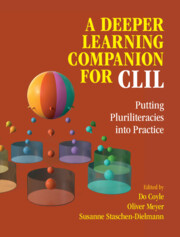Book contents
- A Deeper Learning Companion for CLIL
- A Deeper Learning Companion for CLIL
- Copyright page
- Contents
- Tables
- Figures
- Contributors
- Preface
- Part I Key Ideas and Principles of Pluriliteracies Teaching for Deeper Learning
- 1 Exploring the Mechanics of Deeper Learning
- 2 Exploring the Drivers of Deeper Learning
- 3 Exploring Progression in Deeper Learning
- 4 Designing Deeper Learning Episodes
- Part II Deeper Learning Episodes: First Steps towards Transforming Classrooms
1 - Exploring the Mechanics of Deeper Learning
from Part I - Key Ideas and Principles of Pluriliteracies Teaching for Deeper Learning
Published online by Cambridge University Press: 04 February 2023
- A Deeper Learning Companion for CLIL
- A Deeper Learning Companion for CLIL
- Copyright page
- Contents
- Tables
- Figures
- Contributors
- Preface
- Part I Key Ideas and Principles of Pluriliteracies Teaching for Deeper Learning
- 1 Exploring the Mechanics of Deeper Learning
- 2 Exploring the Drivers of Deeper Learning
- 3 Exploring Progression in Deeper Learning
- 4 Designing Deeper Learning Episodes
- Part II Deeper Learning Episodes: First Steps towards Transforming Classrooms
Summary
For knowledge to become transferable, it needs to be stored in long-term memory in such a way that learners can successfully retrieve it. However, ‘merely’ committing information to long-term memory does not equal deeper learning. Teaching that focuses mostly on facts and does not provide learners with ample opportunities to use and apply their knowledge will lead to so-called inert knowledge, which cannot be accessed to solve problems. To really understand content, our learners need to establish connections between new information and prior knowledge, relate new information to larger contexts and understand its relevance inside and outside the classroom.
- Type
- Chapter
- Information
- A Deeper Learning Companion for CLILPutting Pluriliteracies into Practice, pp. 5 - 7Publisher: Cambridge University PressPrint publication year: 2023



